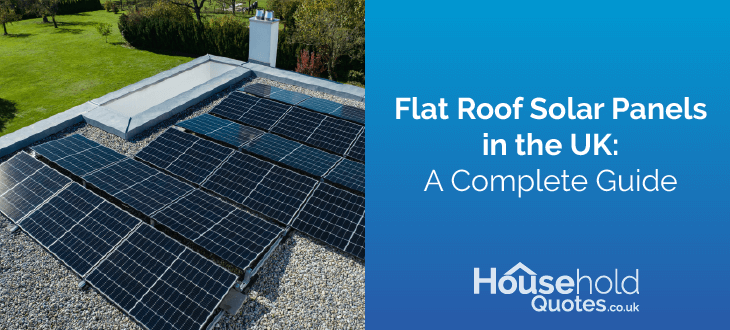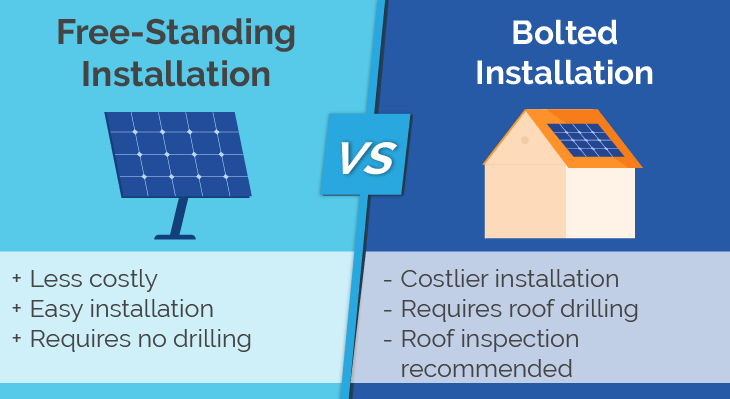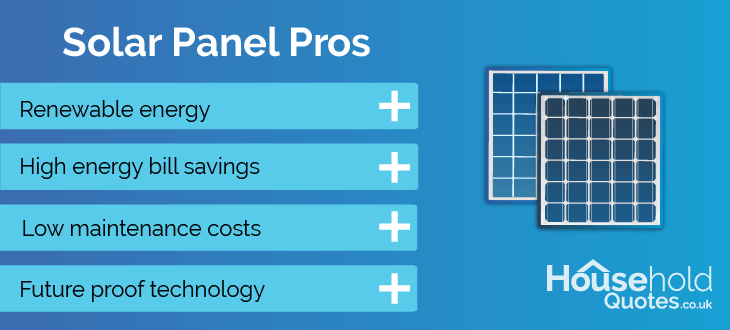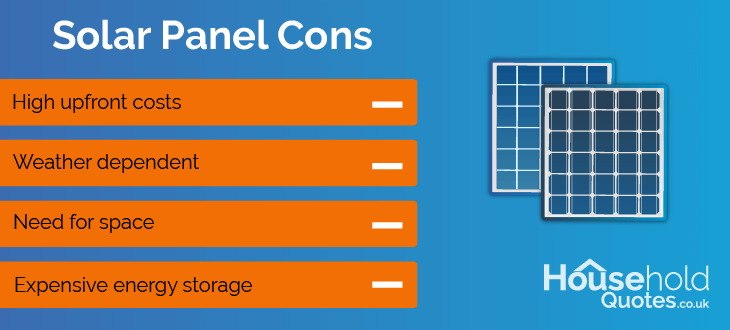Answer these simple questions and we will find you the BEST prices
Which type of solar quotes do you need?
It only takes 30 seconds
100% free with no obligation

Get up to 4 quotes by filling in only 1 quick form

Compare quotes and find yourself the best deal

Increase the value of your home by installing solar panels
- Householdquotes.co.uk
- Solar Panels
- Flat Roof Solar Panels UK
Flat Roof Solar Panels in the UK: Possibilities, Costs & Mounting


- Flat roof solar panels can be mounted by using free-standing solar mounting frames and ballast, or by directly bolting solar frames to the roof.
- For the average 3-bedroom house in the UK, a flat roof solar panel installation will cost around £9,600 - £11,200.
- Flat roof solar panels could lower your heating bills by up to £660 a year.
You might be wondering, can you have solar panels on a flat roof? Popular belief suggests that flat roof properties are not viable for solar energy systems, but we’re happy to disprove that myth. Flat roof properties are just as ideal candidates for solar panel installations, often even easier to set up than on traditional sloped roofs.
Mounting solar panels on flat roof properties can take place without any drilling or permanent fixtures. This makes the job of an installer far simpler and faster. Flat roof installations typically don't require any planning permission either. In addition, solar panels are some of the most popular and impressive energy bill slashers available on the renewables market.
If you live in a flat-roof property and are looking to enjoy solar savings, look no further than Household Quotes UK for the best bargains and trustworthy installers. Instead of spending countless hours on phone calls and online research, simply spend 30 seconds filling out our form and receive 4 free non-binding quotes from our network of trusted professional installers in your area.
- Quotes from local installers
- Payment by finance available
- Save up to £915 per year
It only takes 30 seconds

Can you put solar panels on a flat roof?
Flat roof properties are increasingly popular in the UK, not just for their modern look, but also because they're easier and cheaper to build than traditional pitched roofs. This makes them ideal for solar panel installation or solar thermal panels as part of a solar water heater system, with absolutely no obstacles to getting started.
Many flat-roofed homes across the UK are already enjoying the benefits of solar energy. While there are always considerations for any project (like potential shading from nearby structures or roof strength), solar panel installation on flat roof properties comes with advantages that comfortably outweigh the downsides.
How does the flat roof solar panel mounting work?

Most solar panels on a flat roof can be installed without the need to drill into the roof, thanks to a clever system called ballasting. This is when free-standing solar mounting frames are weighed down with heavy material (gravel, paving slabs, cement blocks), keeping the solar panel system secure and resistant to heavy winds. The solar panel angle is then set by the mounting frame at about 10 degrees for optimum sunlight exposure.
Ballasting has several advantages. It is a far simpler and cost-effective installation than drilling holes, which in turn helps minimise the risk of future roof leakages, and ensures that existing warranties on roof damages aren’t compromised.
However, some roofs are simply unable to withstand the added weight of ballasting. This means that the solar mounting frame would need to be bolted directly to the roof, which requires some drilling and professional help to ensure everything is properly sealed and watertight. Installing solar panels on flat roof properties this way tends to be more expensive and complicated than ballasting.
Before you decide to go ahead with any installation, it is best to:
- Check your roof warranty. Make sure that drilling directly into the roof would not void it.
- Talk to your insurance company. They might have specific requirements or advice for solar panel installations on your property.
- Get your roof inspected. Ensure that your roof can handle the extra weight of panels and mounting hardware.
How much does a flat roof solar panel installation cost?
Installing solar panels for a medium 3 bedroom house will typically cost between £9,600 - £11,200 for flat roofs in the UK, usually cheaper than installation on traditional sloped roofs. However, several factors affect the final price, including your roof's strength, whether it needs a free-standing or bolted system, and how much energy your property uses.
To help you estimate your costs, we've put together a summary of typical supply and installation costs for solar panel systems based on industry standards.
| Home size | System size (kW) | Number of panels | Roof space | Estimated total costs |
|---|---|---|---|---|
| 1 bedroom flat | 3kW solar system | 12 | 22m2 | £4,920 - £5,840 |
| 1-2 bedroom house | 4kW solar system | 16 | 29m2 | £5,600 - £7,200 |
| 3 bedroom house | 5kW solar system | 20 | 32m2 | £8,250 - £8,940 |
| 4-5 bedroom house | 6kW solar system | 24 | 43m2 | £10,400 - £12,100 |
To help UK homes become more energy-efficient, several grants and schemes are available. One popular option is the ECO4 Scheme, which lets low-income households swap out inefficient heating systems for high-efficiency options like solar panels. This can mean average bill savings of around £290, and for the least efficient homes, as much as £1,600 annually!
Homes with solar panels can also reimburse their costs significantly by making use of the Smart Export Guarantee (SEG), a solar grant in the UK that allows homeowners to earn money by selling any extra energy they produce back to the national grid. The exact earning per unit of excess energy varies by the supplier, but a typical three-bedroom home with a 4kW system could save around £660 annually on energy bills.
How much can you save by installing flat roof solar panels?
In the UK, the duration it takes for a solar panel system to pay itself off (break-even time) typically ranges from around 10 to 9 years. This naturally depends on factors like the size of your system, how much energy you use, general electricity prices, and any government incentives you benefit from.
The most enticing aspect of solar energy is that all the electricity you generate is essentially completely free! This can see you saving £440 to £1,005 annually, depending on your energy usage and local electricity prices. Another question you might be wondering about is do solar panels increase home value? The answer is yes; solar panels add significant value to your property.
Below we have summarised the expected costs, savings, and break-even points for a range of solar systems to give you an idea of what to expect:
| System size | 3kW solar system | 4kW solar system | 6kW solar system |
|---|---|---|---|
| Average total cost | £4,920 - £5,840 | £5,600 - £7,200 | £10,400 - £12,100 |
| Average energy consumption | 1,800kWh | 2,700kWh | 4,100kWh |
| Savings (1 year) | £440 | £660 | £1,005 |
| Savings (25 years) | £11,000 | £16,500 | £27,500 |
| Break-even point | 9 | 8 | 10 |
Do these solar savings sound enticing? Through our services, you can gain access to the most competitively priced quotes from some of the most trusted professional installers right in your area. Don’t waste countless hours of your life endlessly researching and vetting installers. Simply fill in our 30-second form and receive 4 free non-binding quotes today!
- Quotes from local installers
- Payment by finance available
- Save up to £915 per year
It only takes 30 seconds

Are solar panels for flat roofs worth it in the UK?
Given all the hype, you may be wondering; are solar panels worth it? We’re happy to assure you that solar panels for flat roofs are without a doubt a worthy investment for clean, reliable, and long-term energy supply, whether in the UK or anywhere else.
However as is the case with any investment, there are pros and cons to consider before making a decision. Let's start by having a look at some of the advantages you could expect:

- Renewable energy: Solar energy is completely free and can last forever (or at least for the next 5 billion years or so until the sun implodes). It produces no greenhouse gases or carbon emissions, and can even be stored in solar batteries for later use.
- High energy bill savings: Solar energy is an impressive energy bill slasher, boasting some of the most impressive long-term savings of any renewable. Moreover, energy schemes like SEG empower you to earn money from your surplus energy by selling it back to the national grid for profit.
- Low maintenance costs: Solar panels are very simple to take care of. They contain no moving parts and do not wear and tear over time. You simply need to keep them relatively clean, which can be done yourself or with services a few times a year.
- Future-proof technology: Developments in the solar power industry are on a constant trajectory of advancement. With improvements intensifying by the day, and given the modular nature of solar panels, you can rest assured that your investment will not be in vain.
To ensure you have a complete understanding when considering investing in solar energy, let us have a look at some of the associated cons you might come across:

- High upfront costs: Solar energy systems aren’t cheap, the initial cost of solar panels, an inverter, batteries, wiring, and installation can add up quickly. However, with developments in the solar field, future costs will continue to go down.
- Weather dependent: While solar energy can still be harnessed on overcast days, panel efficiency inevitably drops. Uninterrupted sun exposure allows for the best results, so it is expected that persistent cloudy days will affect the energy you can generate.
- Need for space: Generating more energy requires more solar panels, and they can occupy considerable roof space. Not every property may be able to accommodate this size span, but luckily, flat roofs are far more space-optimal than traditional sloped roofs.
- Expensive energy storage: Solar energy must be used immediately, or be stored in large solar batteries. These batteries, more common in off-grid systems, are nevertheless a hefty investment on top of an already expensive system.
How to get the best solar panels for a flat roof?
Looking to install solar panels on your flat roof? The decision to go solar is just the start. To ensure that you make the best choice for your property and benefit from solar energy for decades to come, it’s crucial to consult with a professional installer from the get-go to get the best price for the most efficient solar panels in the UK. There are some key factors to consider:
- Panel type: Your choice of solar panel quality, brand, and type can impact your system's energy generation significantly. There are three main types of solar panels for houses: monocrystalline (most efficient), polycrystalline, and thin-film (least efficient and cost-effective). You can also choose standard "on-roof" panels, or roof integrated solar panels.
- Installer certifications: Professional installers in the UK should normally have certain certifications and accreditations. Look for MCS certification, membership in the Renewable Energy Consumer Code (RECC), and affiliation with the Solar Trade Association (STA) to ensure high-standard services.
Though easier said than done, researching and vetting for professional installers can see you spend hours of your life swamped on endless web pages and phone calls. To save yourself the headache, let us handle the vetting for you. Simply fill in our 30-second form and receive up to 4 free non-binding quotes from professional installers right in your area within 48 hours.
- Quotes from local installers
- Payment by finance available
- Save up to £915 per year
It only takes 30 seconds

FAQ
Fortunately, all general solar panel installation is normally categorised as “permitted development”. Additionally, as flat roof solar panels are concealed from view. This means that planning permission for solar panels on flat roofs is not mandatory in most cases.
The solar panels used for flat roof installations are the exact same ones used for sloped roofs or any other type of installation. Most residential solar panel dimensions are around 65 by 39 inches, with a 1.5-inch thickness.
The most effective roofing material is tar and gravel, as it’s stable and supportive to extra weight and more energy efficient as gravel reflects sunlight. Tar and gravel roofs also have long lifespans of up to 30 years. In any case, having your roof
In many cases, free-standing solar panel systems can comfortably be installed onto flat roofs and secured with ballasting (concrete, gravel, paving slabs). To ensure that your roof can support a free-standing solar panel system, it is highly recommended to get your roof inspected before going ahead with installation.

Akif has a keen interest in green home improvement solutions and the role of digital media in identifying climate trends. He aims to provide a multidisciplinary approach to content rooted in credible research and accuracy.
